 Leading Blog | Posts by Month |
 Leading Blog | Posts by Month |
01.31.12

LeadershipNow 140: January 2012 Compilation
Posted by Michael McKinney at 01:54 PM
01.27.12

Managing With a ConscienceWe handicap our potential when we think we have to exploit others to get ahead. Succeeding is not a zero-sum game. We don’t look better when everyone else looks worse.Frank Sonnenberg makes the case in Managing with a Conscience, that the only sustainable way to succeed is the right way—not cutting corners—emphasizing the intangibles like trust, creativity, focus, speed, flexibility, relationships, loyalty, and employee commitment. While not readily measureable, they can make or break leaders and organizations. Sonnenberg believes that leaders who have a jaded view of intangible assets will never make the commitment required to reap their full potential. Sonnenberg discusses at length, nine critical success factors that need to be built into the organization:
Employees have the right to approach management. Management should announce an open-door policy. But announcing is not enough. Employees should feel comfortable approaching management. Ask yourself if you’re in your office long enough to be approached. Are you available at convenient times or only at 7:00 a.m.? Has your administrative assistant done everything to screen you from “outsiders” except put barbed wire outside your office? When a concern was brought to your attention, in confidence, did you divulge any part of the information? Do you just go through the motions of listening? It is up to you to take the initiative and get out of your office to meet with employees. Been seen on a regular basis so people don’t think you’re avoiding them.Sonnenberg writes, “If your organization isn’t focused, someone is probably undoing something you just completed.” How true. As he notes, when people don’t know or understand the organizational purpose, they end up going in different directions, often competing with each other. And this is true in the social media environment, too. It is not unusual to see social media participants undoing an organization’s values and beliefs because they simply don’t understand them or can’t live them. They create conflicting messages that undermine the purpose of the organization. “The costs to society,” writes Sonnenberg, “of everyone acting like random molecules bouncing off one another is just too great. We have no time to think about what is important. We judge someone’s worth by what we see on the outside rather than their inner worth. We envy someone who has achieved success without thinking about what they did to earn it.” We can change that, if we begin with our own example first.

Posted by Michael McKinney at 04:34 PM
01.26.12

Leading Views: Resilience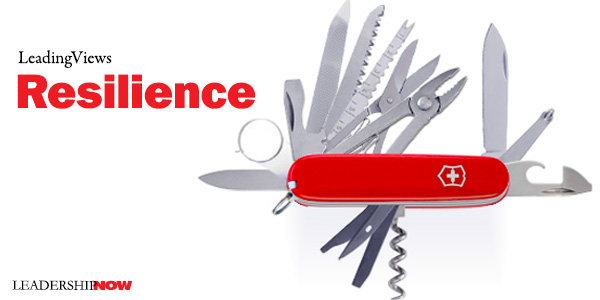
Norm Brodsky and Bo Burlingham, authors of Street Smarts say that the essential quality for business success is resilience—“the ability to bounce back from failure—to turn around a bad situation—to profit from your mistakes.” For the benefit of first-time entrepreneurs the offer four points that lead to business success:

Posted by Michael McKinney at 09:52 PM
01.23.12

The Compound Effect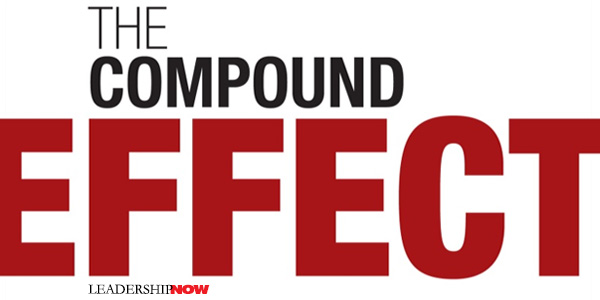
THERE IS NO quick fix—no hack. But the right habits consistently applied in your life will bring you success. It’s the compound effect. The Compound Effect is a reminder of the law of cause and effect. Darren Hardy shares the impact it has had on his life and how you can make yourself accountable for your choices. The Compound Effect is the ripple effect you get from the choices you make. In life, you not only reap what you sow, you reap more than you sow. The seemingly insignificant choices we make daily, will create major changes in your life for good or bad. These are the things we don’t think about because they have no immediate effect. They don’t seem to matter. But over time, they can take you places you never intended. Hardy encourages us to make conscious choices—daily. Given the fact that we have a limited lifespan, the earlier we start consciously making small changes in our behavior, the more powerfully the Compound Effect works in our favor.
Creating habits isn’t easy. Hardy says you have to begin by thinking your way out of the instant gratification trap. “The problem is that the payoff or instant gratification derived from bad habits often far outweighs what’s going on in your rational mind concerning long-term consequences. Indulging in our bad habits doesn’t seem to have any negative effects at all in the moment. But it doesn’t mean you haven’t activated the Compound Effect. Hardy also recommends that when we try to change a habit we should focus on what we are adding-in rather than what we are taking-out. Instead of thinking about all of the TV you will miss in the evening, think about the experience and fulfillment you will gain by adding-in a hobby instead. Instead of focusing on what you have to sacrifice, focus on what you get to add-in. It harder to get started than it is to keep going, so you must be consistent to keep your momentum going. “When you start thinking about slacking off on your routines and rhythms, consider the massive cost of inconsistency. It is not the loss of the single action and tiny results it creates; it is the utter collapse and loss of momentum your entire progress will suffer.” In this regard, it is important to look at what is influencing you—what you feed your mind, the people you spend time with, and your environment will all conspire to bring you closer or further from your goals. Stand guard. Finally, Hardy says to multiply your results by going beyond the expectations; doing the unexpected. Uncommon things deliver uncommon results.

Posted by Michael McKinney at 11:47 PM
01.16.12

12 Reasons You Will Be a Better Leader this Year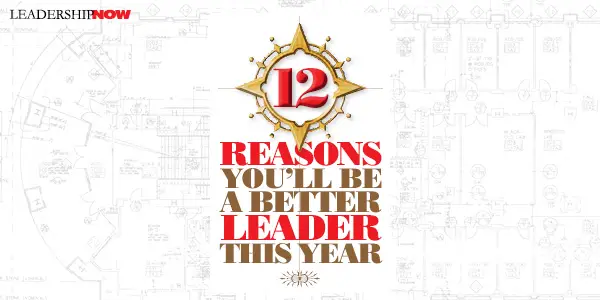
1. Because you are generous with information. You know it enables and values others. 2. Because you eschew the trappings of power. You respect your position too much to let yourself become self-absorbed and disconnected from those you serve. 3. Because you know leadership isn’t about how well you are appreciated, but it’s about endlessly showing your appreciation of others. Leadership isn’t about how you feel, but how you make others feel. 4. Because you are honored to lead, you genuinely respect and care for the people you serve. 5. Because you avoid the trivial and stay focused on your core values and the vision they enable. You will always pay attention to what matters most and you communicate it tirelessly and with clarity. 6. Because you are driven to produce and are accountable for it and expect the same from others. 7. Because you take time to reflect to keep yourself aligned and to continually evaluate your impact. 8. Because you exercise. You know that regular exercise not only makes you feel better physically and it has a profound impact on your cognitive abilities and mental health. 9. Because you are curious, you are committed to being a lifelong learner and building a learning culture within your team and organization. You won’t rely on what worked for you in the past. 10. Because you are humble enough to know that you don’t have all the answers and it doesn’t have to be your way and it is in fact, unhealthy for you to insist on it. 11. Because you are committed to building others greater than yourself. You are validated not by your own knowledge and accomplishments but by those you help to succeed. You are passionate about and energized by the people you serve. 12. Because you know that you are setting an example for others to follow. Everything you do matters. You know it’s not about you.  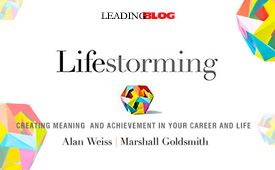
Posted by Michael McKinney at 12:02 AM
01.13.12

Why are Organizations Slow to Respond?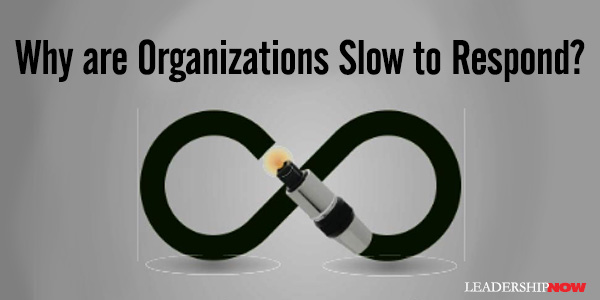
ORGANIZATIONS are only human. Organizations share many characteristics with the people that populate them. Organizations are born, they mature, they age, and they die. The life expectancy of most is about 15 years and only 5% last longer than 50 years. They begin with an innovative idea—even developing beyond all expectations—but eventually they begin to show signs of aging. Claudio Feser writes in Serial Innovators, “Some firms become blinded by success and begin to resist external views and challenges. Some are locked into mental models and become driven by habits. Some lose the sense of purpose that pervaded them in the early days. Some become bureaucratic. Some have processes and incentive systems that have put them on autopilot, leading in a dangerous direction. Some develop dysfunctional organizational cultures.”Occasionally, some organizations resist these all too human tendencies and thrive. They continually reinvent themselves. They confront rigidity. They become serial innovators. We create over time, our own and our organization’s rigidities. Individually, we develop rigidities in the form of biases, lack of self-confidence, and habits. The human mind is quite adept at this in order to create efficiencies. We can only process so much. Organizationally, we create rigidities like structures, performance management, and reward systems, supporting cultures and capabilities that while necessary to some degree, often prevent us from adapting rapidly. Worse still, we add complexities to existing structures, processes, values and norms, without ever rethinking and possibly eliminating obsolete ideas and procedures. All of this can cause entropy and our demise. Rigidities are not going to go away, but we can learn to manage them better. Feser says that organizations that want to become serial innovators must do the following:
Again, it is a leadership issue with a leadership solution. If company leaders do not accept challenging and diverging views, neither will the organization. After all, organizations are only human. 
Posted by Michael McKinney at 10:11 AM
01.11.12

What You Need to Know About Why People Fail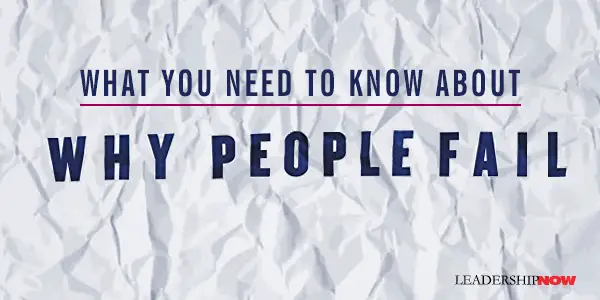
“There are thousands of books on success. But very few on failure,” begins Siimon Reynolds in Why People Fail. “Yet mastering failure is surely a vital step in achieving your aims, hopes, and dreams.” He is passionately driven to take the "taboo" out of failure. As Reynolds suggests, it is a "forbidden subject. We're not supposed to fail, and if we do, we're supposed to hide it from everybody. It gives people the wrong impression about what it takes to be successful." Failure leads to success—if you see it as a process. “If someone has achieved more than you, it’s not usually because they are better than you or smarter than you. It’s because they have discovered a better strategy for success.” Reynolds has identified 16 reasons for failure. They are: 1. Unclear purpose 2. Destructive thinking 3. Low productivity 4. Fixed mindset 5. Weak energy 6. Not asking the right questions 7. Poor presentation skills 8. Mistaking IQ for EQ 9. Poor self-image 10. Not enough thinking 11. No daily rituals 12. Stress 13. Few relationships 14. Lack of persistence 15. Money obsession 16. Not focusing on strengths

Posted by Michael McKinney at 06:31 PM
01.09.12

What if Everything is Perfect? As a leader and someone that your team looks to for guidance and advice, has the question occurred to you… What if everything is perfect? What if everything that happens, everything that has happened, and everything that will happen is exactly what had to happen, is happening and needs to happen for your benefit and the benefit of your organization. Now I’m not asking you to take this on as “the truth,” even though it might be. I’m asking you to take this on for your benefit, as something that will empower you as you move forward in your position as a leader in your organization and in your life. Because to not take this on, what you don’t realize is that you turn yourself into a victim. And I must say that being a victim is a very popular game. Don’t take responsibility; it’s always something or someone else doing it to you. It’s never your fault. You’re just this helpless weather vane in the wind of life. Sound familiar? Here’s why it’s empowering to act as if everything is perfect: because then you will learn and grow from the experiences of life and constantly become more of who you could be. And, I assert, becoming more of who you could be is exactly what you want to use this life for. How does this work? First you have to start from the proposition that life and business is not about winning or losing. Rather, it’s about winning or having learning experiences. So you look at everything either as a win, in which case you celebrate the win and learn how to continue winning, or as a learning experience, not a win, in which case you also learn how to do a better job next time so that you increase the likelihood of winning. Either way, you win. Here’s a common example: you have a conversation with someone and it doesn’t go very well, maybe it actually turns into an argument, maybe you leave with your feelings hurt, whatever. From the perspective of a victim, you blame the other, they blame you, you dig deeper into your position and you plan your next attack. But if you look from the perspective of perfection, you look to see what went wrong in the conversation, how come it turned into an argument, what you did to contribute to that, what you could do in the future so that things like that don’t happen again, and you even look to see that maybe you need to apologize to the other and get the conversation cleaned up. Trust me on this one and give it a try. You will discover a power within yourself that you didn’t know was there if you look at everything as perfect and take responsibility for it all. Scott Hunter has been transforming organizations for over two decades, through his innovative programs that enable people in leadership positions to master the “being” of leadership rather than the “doing” of it. His keynote speeches, workshops, retreats and management team coaching enable senior managers to shift the paradigm in which they operate so that they achieve breakthrough results and outstanding performance. Scott is the originator of the Unshackled Leadership philosophy and author of the groundbreaking book Unshackled Leadership: Building Businesses Based on Faith, Trust, Possibility and Abundance.
Posted by Michael McKinney at 10:42 PM
01.04.12

Leading Views: James Stockdale on Leadership In A Vietnam Experience: Ten Years of Reflection (1984) by James Stockdale, he writes: In A Vietnam Experience: Ten Years of Reflection (1984) by James Stockdale, he writes:
Leadership must be based on goodwill. Goodwill does not mean posturing and, least of all, pandering to the mob. It means obvious and wholehearted commitment to helping followers. We are tired of leaders we fear, tired of leaders we love, and most tired of leaders who let us take liberties with them. What we need for leaders are men of the heart who are so helpful that they, in effect, do away with the need of their jobs. But leaders like that are never out of a job, never out of followers. Strange as it sounds, great leaders gain authority by giving it away.
Posted by Michael McKinney at 05:51 PM
01.03.12

Power Corrupts Sooner than You Think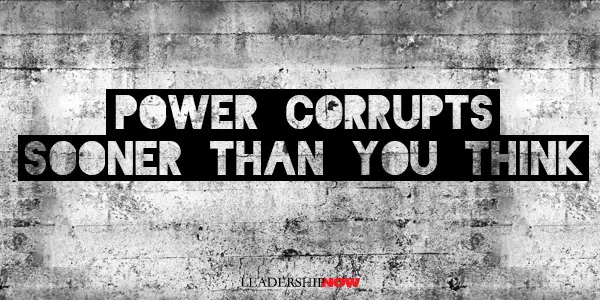
IN A LETTER to Bishop Mandell Creighton in 1887, Lord Acton observed that “Power tends to corrupt, and absolute power corrupts absolutely. Great men are almost always bad men.” British Prime Minister William Pitt also observed, “Unlimited power is apt to corrupt the minds of those who possess it.” Power is a tricky thing and we rely on it more than we should. In a study by Adam Galinsky and others, they found that when people where power primed—temporarily made to feel powerful—they demonstrated a reduced tendency to comprehend how others see, think, and feel as compared with those that were primed with low power. They relied too heavily on their own vantage points and demonstrated less accuracy when assessing the emotions and thoughts of others. The possession of power or even the feeling of power tends to very quickly change how we think. We easily slip into thinking we are something we are not, to become absorbed with ourselves, to think, “It’s all about me.” Our ego can quickly blind us to reality—self-deception sets in very quickly. We lose self-awareness and therefore our sense of the impact we are having on others. We would do well to remember the Stripes Rule. Denny Strigl, former CEO and president of Verizon Wireless, recalls in Managers, Can You Hear Me Now?: When I became president of Ameritech’s cellular subsidiary, Ameritech Mobile, the chairman of Ameritech told me something that has stayed with me ever since. He said I would be managing an entire company, and as the company’s most senior manager, I should always remember that the “stripes” I have been given are on the coat I wear, not on the person who wears the coat. He cautioned me not to let the job go to my head because when I take the coat off, I will just be a person like any other. Power, it seems, can easily become a handicap and not a blessing to leading well. But it often comes with the territory. A wise leader might keep Lord Acton’s words front and center.
Posted by Michael McKinney at 09:25 AM
01.01.12

First Look: Leadership Books for January 2012Here's a look at some of the best leadership books to be released in January.




For bulk orders call 1-800-423-8273  Build your leadership library with these specials on over 120 titles. All titles are at least 40% off the list price and are available only in limited quantities. "He that loves a book will never want a faithful friend, a wholesome counselor, a cheerful companion, an effectual comforter. By study, by reading, by thinking, one may innocently divert and pleasantly entertain himself, as in all weathers, as in all fortunes." — Isaac Barrow
Posted by Michael McKinney at 02:26 PM
|
BUILD YOUR KNOWLEDGE


How to Do Your Start-Up Right STRAIGHT TALK FOR START-UPS 
Grow Your Leadership Skills NEW AND UPCOMING LEADERSHIP BOOKS 
Leadership Minute BITE-SIZE CONCEPTS YOU CAN CHEW ON 
Classic Leadership Books BOOKS TO READ BEFORE YOU LEAD |
|